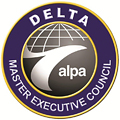 |
|
|
ALPA to U.S. DOT: Dreamjet is a “Far Cry” from NAI
On Friday, May 9, ALPA made a filing with the U.S.
Department of Transportation in which it described the
differences between Dreamjet’s and Norwegian Air
International’s (NAI) applications for a DOT foreign air
carrier permit. Joined by the Transportation Trades
Department, AFL-CIO, and the European Cockpit Association,
ALPA contrasted Dreamjet’s garden variety application with
NAI’s attempt to avoid Norwegian labor law.
Read the
entire release | Learn more about the issue at
“Leadership from the Cockpit” |
|
 ALPA Gains Greater Use of Jumpseat in Canada ALPA Gains Greater Use of Jumpseat in Canada
Following many months of ALPA advocacy, Transport Canada (TC)
has lifted a long-standing flight deck jumpseat restriction
which prohibited its use by commuting pilots unless no seats
were available in the aircraft cabin. By exemption to
Subsection 705.27(3) of the Canadian Aviation Regulations
(CARS), TC ended the prohibition that was put in place after
the events of 9/11. The CARS now permit Canadian air
operators to offer the seat to commuting pilots on domestic
flights; the regulations also maintain Captain’s Authority
by stipulating that permission to occupy the jumpseat is
granted by the pilot-in-command.
Although the amendment is presently applicable only to
“commuting” pilots (i.e., those who are in travel status to
or from a flight assignment), ALPA is working with TC to
broaden the jumpseat travel rights to all authorized and
properly identified pilots, regardless of work status. |
|
 Where Is the Delta MEC? Where Is the Delta MEC?
Turns out, they will be all over. Next month, the Delta MEC,
along with LEC representatives, Negotiating Committee
members, and various other committee members, will travel to
six domiciles to hold informal discussions on the issues
facing Delta pilots. The group will visit Salt Lake City (SLC),
Minneapolis (MSP), San Diego (SAN), Cincinnati (CVG),
Detroit (DTW), and Dallas (DFW). For further details and to
RSVP, visit the Delta Pilot Network at
www.deltapilotnetwork.org. |
|
Leading the Way: First Air Installs In-Flight Data System
As airlines worldwide examine ways to improve their ability to
identify safety problems on aircraft in flight in the wake of
the Malaysian 370 mystery, flightcrew members at Canada’s First
Air have collaborated with management to make their airline one
of the first to install such a system. First Air is the launch
customer for the FLYHTStream system, which automatically begins
live-streaming selected flight-recorder data via satellite to a
ground station if an aircraft experiences difficulty while
airborne.
First Air became interested in the system several years ago
because it does most of its flying in remote, rugged parts of
the Arctic. Weighing safety improvements against the need to
ensure all data is used only for safety purposes, the First Air
MEC has agreed to allow the restricted use of streaming
in-flight data under only three very limited conditions: an
engine fire, an engine failure, or a loss of pressurization.
These are all events where the flight crew would initiate the
“event” process under their current SOP. First Air hopes to
launch the new system in the next few weeks throughout its fleet
of ATR and B-737 combis and B-767 and Hercules freighters. |
|
Contract Compliance at Compass—It’s Being Tracked
With a new six-year contract now signed and in place, the
Compass Airlines MEC is setting up a system to make sure
management follows the agreement. After more than a year of
work, Compass’s Contract Committee has created a new online
Dispute Tracking System where pilots at the Delta Connection
carrier can log in and report potential contract compliance
problems. The URL for the new site is
cpzpilotissue.alpa.org.
Compass pilots can log in to the site and file a report with
supporting documentation—including pay stubs, schedules, e-mail
correspondence and the like—whenever they suspect management is
violating the contract. The Contract Committee will review the
information and determine whether a violation has occurred. The
system is secure, private, and password-protected, and pilots
who file reports can track the progress of their issue by
logging in and reviewing the report status. |
|
 KCM Opens in the Big Easy KCM Opens in the Big Easy
On Friday, May 16, the Known Crewmember (KCM) program will
expand to include Louis Armstrong New Orleans International
Airport (MSY). With the addition of MSY, KCM will be available
in 47 airports across the United States. KCM is a risk-based
security screening program that enables TSA officers to
positively verify the identity and employment status of airline
crewmembers. KCM facilities are dedicated security screening
lanes for use by prescreened airline personnel that allow
passengers in separate lines to move through TSA checkpoints
with less delay. Testing of risk-based screening for flight
crews began in 2008 and was approved by the TSA for expansion in
2009. As a result of ALPA’s successful partnerships with
Airlines for America and the TSA, KCM has evolved into a robust
nationwide program, having screened more than 16 million
transits to date.
Learn more at
www.knowncrewmember.org or on the KCM tab of the ALPA app
for iPhone and Android users. |
|
|
|
|
ALPA
represents more than 51,000 pilots at 32 airlines in the
United States and Canada.
Visit us online at
www.alpa.org. |
|
|
|


![]()